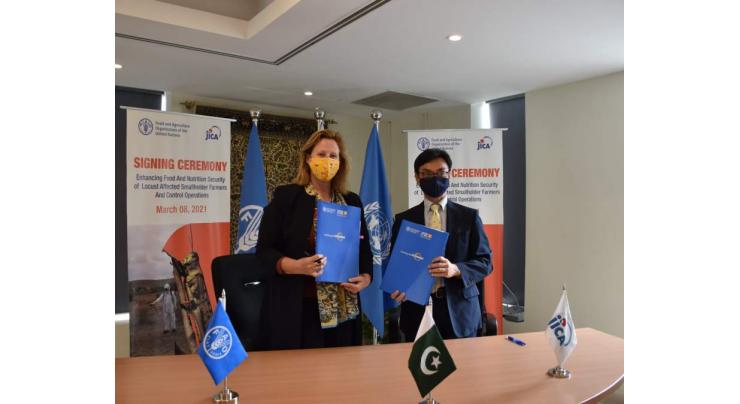
- Home
- Pakistan
- News
- Japan International Cooperation Agency and FAO join hands to enhance food and nutrition security of ..
Japan International Cooperation Agency And FAO Join Hands To Enhance Food And Nutrition Security Of Locust-affected Smallholder Farmers And Control Operations
Umer Jamshaid Published March 08, 2021 | 04:54 PM

Japan International Cooperation Agency (JICA) has announced a contribution of USD 1.3 million to work by the Food and Agriculture Organization of the United Nations (FAO) to not only support pest control operations but also enhance the food and nutrition security of locust-affected smallholder farmers
ISLAMABAD (UrduPoint / Pakistan Point News - 08rd March, 2021) Japan International Cooperation Agency (JICA) has announced a contribution of USD 1.3 million to work by the Food and Agriculture Organization of the United Nations (FAO) to not only support pest control operations but also enhance the food and nutrition security of locust-affected smallholder farmers.
The announcement was made at a ceremony held in Islamabad. JICA Chief Representative in Pakistan, Furutu Shigeki, and ad interim Food and Agriculture Organization (FAO) Representative, Rebekah Bell, signed the project agreement.
To support the livelihoods of desert locust-affected farming communities and enhance the food security of smallholder farmers’ households, the project will work in Kharan district in Balochistan and Umerkot district of Sindh province. These districts were identified based on consultation with provincial agriculture departments and findings of Food Security and Livelihood Assessments.
This 13-month project will focus on enhancing food and nutrition security of vulnerable rural households with pregnant and lactating women through an integrated approach, which seeks to increase the quantity, quality and diversity of household food production, and includes an experiential nutrition education programme. About 18,370 people will directly benefit.
Meanwhile, locust surveillance and control activities will focus on building the capacity of the Department of Plant Protection to help it identify and control future locust outbreaks.
“As have East Africa, the Middle East and South Asia, Pakistan too has suffered the damage caused by desert locust swarms. JICA recognizes the need for immediate assistance to Pakistan and implemented an emergency support to livelihoods of farmers affected by locust in October last year.
In order to continue its assistance, JICA endeavors to restore livelihood support for farmers. We expect to strengthen locust control capacity and resilience in the medium to long term and the collaboration with FAO will contribute to achieving that goal,” said Furutu Shigeki.
JICA is currently promoting cooperation with development partners, and this project will further strengthen the FAO-JICA Memorandum of Cooperation, which was concluded in 2017. JICA is currently implementing agricultural and livestock technical cooperation project in Balochistan and Sindh provinces. Also, JICA has funded an agriculture and livelihood project being implemented by FAO in ex-FATA (Federally Administrated Tribal Areas) of Khyber Pakhtunkhwa province. JICA intends to continue its work with FAO and other development partners to contribute to the development of the Pakistani agricultural sector by taking the best of its strengths.
Thanking JICA for its financial assistance and long-term partnership, FAO Representative a.i in Pakistan, Rebekah Bell said: "Through our collaboration with the governments of Balochistan and Sindh, this project will make a significant contribution to address food and nutrition insecurity of vulnerable rural households. Our research suggests that by increasing the quantity, quality and diversity of household food production that families are able to consume a healthier diet that will hopefully, in the longer term, contribute to the prevention of child stunting and wasting and improved food security. FAO has remained at the forefront of support to the Government of Pakistan in combating the desert locust invasion and strengthening the capabilities and capacities of institutions in desert locust surveillance and control operations.”
Related Topics
Recent Stories

Experts raise concerns over introduction of 10-stick packs

Iranian president arrives in Karachi

Law Minister expresses Govt's resolve to address issue of missing persons

Rizwan’s batting order may be changed: Sources

Nawaz Sharif to visit Guangzhou exhibition in China

FM Dar not traveling to China: Foreign Office

PM takes notice of deliberate delay in tax cases

Iranian President visits Allama Iqbal’s mausoleum

Iranian President arrives in Lahore today

Currency Rate In Pakistan - Dollar, Euro, Pound, Riyal Rates On 23 April 2024

Today Gold Rate in Pakistan 23 April 2024

Islam enlightened world with its teachings about knowledge: Dr Jamileh
More Stories From Pakistan
-
Punjab to welcome Iran's investment in livestock sector: Maryam; emphasises stronger industrial, agr ..
5 minutes ago -
SNGPL fines eight consumers for illegal use of meters
5 minutes ago -
Station Commander Dera highlights importance of Co-Curricular activities for students
5 minutes ago -
Two more lifts to be installed at Wah Hospital soon
5 minutes ago -
Japanese envoy calls on law minister
5 minutes ago -
Protectorate of Emigrants Office in Abbottabad to be fully functional by June 2024: NA told
15 minutes ago
-
SEED orgainises IT recruitment drive
15 minutes ago -
One person killed in roof collapse in Karachi
15 minutes ago -
Master planning being done keeping in mind 20-year needs: DC
15 minutes ago -
Kashmir delegations, GB Councils members calls on Engr Amir Muqam
15 minutes ago -
Shaheera Shahid visits Press Council of Pakistan
25 minutes ago -
Governor Punjab hails Pak-Iran friendship
25 minutes ago